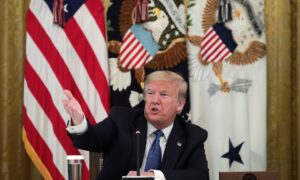President Donald Trump signed an executive order last week aimed to boost the pandemic-weakened economy and strengthen basic due process protections for Americans involved in agency regulatory proceedings as part of what the administration calls the Regulatory Bill of Rights.
“To protect our people and defeat the virus, we must also defend the health of our nations economy,” the president said at a cabinet meeting on May 19. “To achieve this goal, weve slashed red tape and bureaucracy and unleashed the largest industrial mobilization since World War Two.”
The document, known as Executive Order 13924, instructs federal agencies to look at regulatory actions they could take to encourage growth in the economy. The order instructs “federal agencies to use any and all authority to waive, suspend, and eliminate unnecessary regulations that impede economic recovery.”
“Just as we continue to battle COVID-19 itself, so too must we now join together to overcome the effects the virus has had on our economy,” the order states.
The libertarian Cato Institute advocated a Citizens Regulatory Bill of Rights in 1995. It called for the federal government to, among other things, provide people with written notice of the legal basis for an inspection or search when one is conducted. Years later, Trump moved forward with his own attempt at combating the so-called administrative state, as his administration early on made a focus of slashing regulations.
Critics say officials in the administrative state are unaccountable to voters and allow unelected bureaucrats to usurp the functions of the executive, legislative, and judicial branches. Congress, they say, is supposed to make the laws of the land, but lawmakers have steadily ceded that bodys constitutional powers to the administrative state, to the overall detriment of society.
Two months before the president unveiled his order, the Sacramento, California-based Pacific Legal Foundation (PLF), a nonprofit and public interest law firm, submitted a 46-page comment to the Office of Management and Budget (OMB). The document offered examples from PLFs portfolio of public interest litigation regarding regulatory due process violations and recommending due process principles that included each of the 10 regulatory reform-related items the president listed.
Among the complaints against regulators raised by PLF are that agencies fail to provide notice of the scope or content of investigations, use biased and unreliable evidence, and withhold exculpatory evidence, as they presume the other sides guilt instead of bearing the burden of proof.
Other complaints are that agencies threaten excessive penalties to force people into settlements, that cases are tried before biased agency adjudicators instead of independent courts, and that rules are issued by mere agency employees, rather than by properly appointed officers overseen by the elected president.
“While we are excited that the administration took our recommendations seriously, it now falls on the individual agencies and the OMB to change their current practices to conform to the principles the president has reaffirmed,” said Todd Gaziano, director of the Center for the Separation of Powers at PLF, in a statement.
“PLF will continue to fight until the aspirational goals of the Regulatory Bill of Rights become a reality.”
A new report released by the group, Read More From Source
[contf]
[contfnew]

The Epoch Times
[contfnewc]
[contfnewc]























































